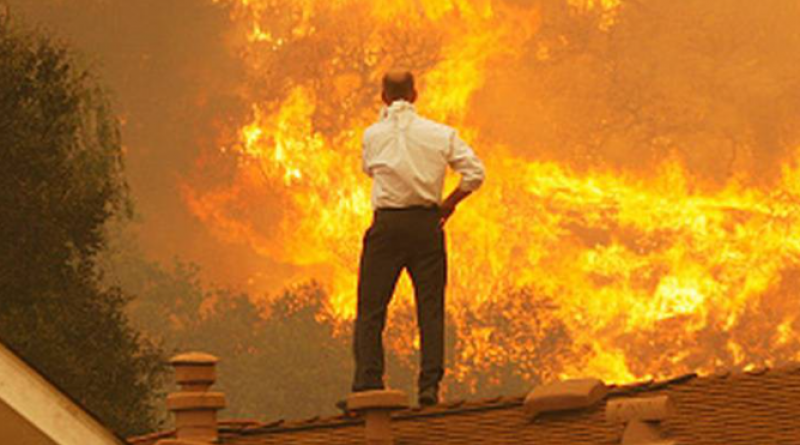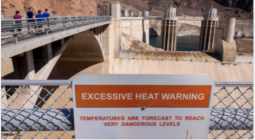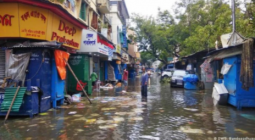We’re Losing the Battle for the Future.

This is Why it Feels Like We Might Not Have a Future Anymore
I don’t know if you’ve noticed, but the world is on fire. That’s a symptom of a grim trend. We’re losing the battle for the future. Is there going to be much of a future? What will it look like? Let me give you a few visceral examples of how we’re losing the battle for the future, and then we’ll discuss those questions a little bit.
I don’t like framing things as “battles” or “wars.” I’m doing it in this case because unfortunately that’s what Americans respond to, a call for aggression and hostility. So with that caveat, which I’ll come back to, let me continue.
It appears that we just might have tipped the planet into runaway global warming. Things are not right. They don’t feel right. It shouldn’t be this hot. That’s even according to climate scientists, who’ve seen their predictions shattered. Siberia shouldn’t be melting this catastrophically fast, nor should the Arctic. Canada shouldn’t have some of the hottest places on earth. Smoke plumes shouldn’t be stretching across all of North America. We’re past the territory of worst cases now.
The planet appears to have been pushed past its limits. The heat we’re all experiencing right about now — or flood, drought, typhoon, take your pick of “extreme events” — is intensifying incredibly rapidly. It’s as if we’ve disturbed the basic homeostatic systems which keep the planet in balance. And having disturbed them too much — the Amazon is now a net emitter of carbon, not a carbon sink, the Siberian permafrost is melting, releasing vast methane deposits, the ocean currents which recirculate and cool warm water are slowing — global warming is accelerating in frightening ways.
It’s happening too suddenly, too fast. It wasn’t supposed to be like this. How are we going to live on a boiling planet? I suspect you know the answer to that question.
Then there’s Covid. We’re more or less in a worst case scenario at the moment when it comes to that, too. The vaccines work, yes. But their efficacy is dropping with startling speed. Scientists have already concluded we’ll need boosters. How often? Every year, maybe every six months. Efficacy is dropping because new strains are emerging. New strains are emerging because we’re not vaccinating the planet faster than cases go on skyrocketing.
So what happens when — inevitably — one set of annual or biannual boosters fails? Doesn’t catch a new variant in time? That’s the scenario every thoughtful person was worried about. Then, all hell breaks loose. Societies go back into lockdown. Hospitals overflow. Deaths and hospitalisations skyrocket. Now we live under the threat of all that — for the foreseeable future.
It wasn’t supposed to be like this.
What is “the future” anyways? For most of human history, this thing called “the future” didn’t exist. It’s a modern creation, a recent one. “The future” is a certain kind of myth: technology will solve all our problems, with wondrous labour-saving devices, which will forever lower prices, and raise the standard of living. Hence, “the future,” for those who still believe in it, tends to consist of utopian techno fantasies.
But who still believes in the future?
In this age, “the future,” at least for the dwindling adherents of the idea, looks incredibly weird, gruesome, and bizarre. Machines, we’re told, will suck the carbon from the sky. Robots will be our best friends, providing the companionship we can’t to each other. Massive algorithms will allocate labour — decide who works where and for whom and when — with perfect efficiency. They’ll also tell you what to do. Who to date, love, what to buy, wear, think, believe, know. “The future” in this conception — what’s left of it — is a place where love, truth, beauty, goodness, trust, happiness, don’t exist…because they don’t need to. Machines do all that “work” for us.
Nobody thoughtful really thinks of that as some kind of desirable state of the world. It’s good for sociopaths, billionaires, and politicians, but mostly I repeat myself. In this state of the future, the planet’s still a dystopia of annihilation, disease, inequality, despair, and ruin — only we’re glued to some kind of Matrix of pleasure all the way down into hell. Sound like a good deal to you? Are you an idiot?
The adherents of the future, at this point, come in three categories. One, nerds, people who work in “tech.” They’re techno-serfs, basically. Two, venture capitalists, whose job at this point appears to be spinning ever more ludicrous yarns of a glittering algorithm world. And three, the kind of person who has a fetishistic devotion to salvation through technology. The truth, though, is that there aren’t that many people in this group.
There are far, far more of us in the other group. The ones who’ve lost faith in the future. Who don’t think there is much of one. No, you’re not crazy. It’s a far more reasonable position to take. Why? Well, because, the truth is that we’re probably way past the point of no return. Every thoughtful mind can see the writing on the wall. Experts, like me, can weight in with facts. Ecologists will tell you that mass annihilation is going to rip us apart, too. Climate scientists will tell you it hasn’t been this hot for millions of years, and every year, the temperature goes up by the equivalent in bio-geological time, of a few million years.
Economists like me can tell you that the investment rate of our civilisation is far, far too low for us to reverse the damage we’ve inflicted on the planet, ourselves, our societies, and our consumption is rate, is way, way too high, and we can’t invest because “capital,” aka the ultra-rich and corporations, have hoarded all the money, gains, resources.
Faith in the future is dwindling for a very, very good set of reasons. Factual ones, empirical ones, logical ones. It isn’t some kind of alarmism or hysteria to have lost faith in the future. At this juncture in human history — the planet’s literally on fire while billionaires jet off to space in dong-shaped rockets — it’s common sense.
So if the future isn’t “the future” — if the myth of constant growth, progress, and expansion, driven by miraculous labour-saving technology — anymore, then, well, what’s in store for us? The answer to that’s pretty simple. Regress is.
What does a world crossing the threshold of runaway global warming have in store for it? You might imagine that people will unite in some kind of grand, noble revolution to save the planet, but unfortunately, that’s not going to happen. Instead, the opposite is.
People will flee from Fire and Flood and Plague Belts. As they do, entire economies will begin to collapse, and societies implode. Think about a Napa Valley that can’t make wine. Factories that can’t produce things, homes which can’t be insured, basic infrastructure systems — transport, food, water, energy — which no longer work. Bang. Game over. Entire regions and cities just wink out. As they do, economies grow depressed, while prices skyrocket. If you have a sense that that’s beginning to happen already, you’re precisely correct.
As huge waves of “human capital flight” — read mass migration — ensue, the political result will be, sadly, that today’s nationalism becomes tomorrow’s fascism. Look at how fast Britain — once the envy of the world, gentle, kind, friendly, expansive — fell into a catastrophic nationalism that utterly wrecked its future. Depressed economies need scapegoats. Demagogues arise to point the finger at anyone remotely foreign, different, other. The future looks ultra-fascist, at least to those who’ve studied history.
Do you think any nation will be happy to welcome, say, a million climate refugees? When it’s own systems are already buckling, because the planet’s boiling? When it’s own regions are flooding or burning or both? Of course not. It’ll be fodder for demagogues, who’ll blame the migrants for the woes of the pure and true.
Meanwhile, living on a burning planet is going to continue basically driving much of the human race verifiably insane. Take a look at how fast and hard bizarre delusions spread. It’s not just Facebook — that’s just the mechanism. It’s that life is incredibly stressful, to the point that many of us can’t cope. We need the delusions, just to make through another day. Much easier to hate someone slightly different from you than work together to solve real problems. Much easier to descend into superstition and fanaticism and fundamentalism than think through the plight we’re in these days.
But it’s hardly just the fanatical right-wing coterie which adores the disinformation on Facebook that’s lost the plot. It’s also mainstream society. Who wants to believe that elites really want to kill all of us, happily? That Covid and global warming appear to be whole new “profit centres”, which is why precisely nothing much is being done about them systematically or globally? Eff that, man. I’m gonna go see what my new Best Friend Forever is doing. Wow! Check out the pecs, boobs, airbrushing on that influencer! I wish I had the kind of life they do. They’re perfect. Wait, maybe if I just buy some more stuff…
Escapism rules the day. The number of rich Westerners who appear to care about the planet being vaccinated is precisely zero. The number who care passionately about Britney Spears ranks in the millions. Sure, care about Britney. But also maybe shed a tear for, I don’t know, the world? But we don’t live in societies like that. We live in societies of zombified cave-dwellers now. They’re not trying to grasp Plato’s Ideal, either. They’re just grunting at each other by firelight, too afraid to stare out into the night.
Faith in the future is one of the linchpins which held our civilisation together. The myths of technological progress, economic growth, and living standards rising in tandem forever — eternally — are what sold the thing known as “the global economy” to the world. Only now they appear to have been proven badly wrong. The people dismissed as “pessimists” and “alarmists” in the 70s and 80s and 90s — ecologists, climate scientists, economists — appear to have been exactly right.
It’s not as if it’s a new thought, after all, that overconsuming rampantly, and not giving one tiny shred of a damn about, say, investing in global systems to give every child on earth water and sanction and food, or every species room and nourishment to live, or every ecology protection and resources, or else — it’s not as if that’s new. Or else what? It was pointed out in the late 60s and early 70s that the shell game of “growth” — at least growth predicated on fossil fuels, industrialization, which culminate in mass consumption — was going to destabilise the planet. And along with it would probably go out societies, economies, nations, cities, and communities.
The tragedy is that nobody listening. But the greater tragedy is that nobody’s still listening. Take the example of North America. Giant smoke plumes literally stretch across the continent. Americans could care less. Give them violence, porn, hate, and the illusion they’ll get rich one day, like the billionaires who own their meaningless lives — and they’re totally indifferent even to their own continent beginning to literally go up in flames.
Meanwhile, the poor world doesn’t have the time, energy, or resources to do much. Its people are busy working around the clock in modern-day indentured servitude to make stuff super cheap to feed the insatiable maw of the rich world with. 85% of humanity exists to serve the whims of the other 15%, and that 15% is accustomed to consuming things so rampantly, remorselessly, stupidly, that the planet’s ecosystems have been chewed through in a matter of decades.
Nobody’s still listening. The old graybeards are right where they were. Still trying to warn us all. This time, they have the cold comfort of knowing they were right. Joining them are a new cast of ragtag characters — disillusioned figures like me, who couldn’t be part of a system that was killing the world. It’s not exactly an Empire-beating rebel alliance. Yet here we are, trying to warn you.
And it’s not like we’re the only ones. The planet is trying to warn you. Flood, fire, plague, drought. Consider them all a message from a time that doesn’t exist anymore. The future. It’s not here anymore. Now, light speed regress is. We’re heading back to a quasi-medieval state of politics, economics, society. Lords and serfs. Kings and nobles. Life, worthless. Rights, meaningless. Democracy, a distant memory. Blood and soil, the threads which hold everything together. Tribe against tribe, clan against clan, every person for themselves when all that breaks down. Superstition and fanaticism replacing reason and logic. A complete inability to act collectively. Violence and brutality replace the rule of law. Mass death? Catastrophe? Disaster? Shrug. At least it wasn’t me and mine, friend. I don’t even own the fields I till.
We don’t have a future to believe in anymore. You can see it in the way the human mind is breaking down, in the way culture is collapsing, the way that desperately, stupidly, so many are turning to anything else, religion, extremism, conspiracy, dumb influencers, elaborate video games, comic books, the way everything’s getting more infantile and narcissistic as the world burns. The future isn’t here anymore.
Maybe it never was. Maybe the death of the future is a good thing. The problem though is that people like us, with a future to believe in? We don’t have anything. Because we don’t have a past we respect, an inheritance that comes from the rivers and forests, the sense ancients had of deep respect for the world. Without the future, we’ve lost our bearings. The past was always something for us to have contempt for, to scorn and mock as backwards. So when the future died, what were we left with?
It’s true that the past was backwards. Our civilisation’s was. Slavery, empire, Inquisition. But there is a healthy respect, too, for a deeper past. The way that indigenous peoples have far more sophisticated ethical notions than ours, ones of interdependence with nature. Or the way that their societies were often far more consensual and nonviolent than ours, too.
We need to go back, probably, to go forward. The future isn’t a thing we can make with machines. Our mistake, our undoing. The future needs to carry forward what’s good in the past, what’s true, what’s beautiful, and keep on doing it. We didn’t do that. We gave up the old ways — the really old ones. The ones which would have said that taking a life, even a little one, without thanking it, without grieving for it, brings shame. Or the ones which would have been repelled and sickened in their souls by the idea of ripping down a forest or polluting an ocean.
Sorry. I’ve got to go see what my favourite influencer’s doing. I don’t have time for this. What the hell is wrong with this guy! Maybe if I just have their perfect life, maybe if I have perfect boobs, chiseled pecs, a bulging bank account, a glittering smile, I can forget, for a few seconds, about the fact that we’re all burning up on a dying planet.
Our ancestors are ashamed of us, my friends. We are the people who disgraced the past, to create a myth called “the future.” That myth failed because there was no soul in it, no depth, no humanity. It was a vision of power, control, slavery, and violence, if we strip the gloss away. Machines — or subhumans — doing the work we didn’t want to do, so we could gorge ourselves into oblivion, instead of grappling with the big, beautiful, dangerous questions of being alive, existing, feeling, being connected, here, now on a tiny ball of dust, spinning through the darkness. The meaning and purpose and truth and beauty of it all. What kind of creepy way of life is that? Is that even living much at all?
I think we’ll probably be among the the last generations to believe in “the future.” And I think that’s an eminently good thing, too. Because the civilisation which comes after ours — after ours finishes collapsing into dust, by way of fire, flood, and plague — is going to look a lot more like the very, very old ones. How do I know?
They were around thousands of times longer than us.
Maybe that should have told us something.
July 2021
eand.co




